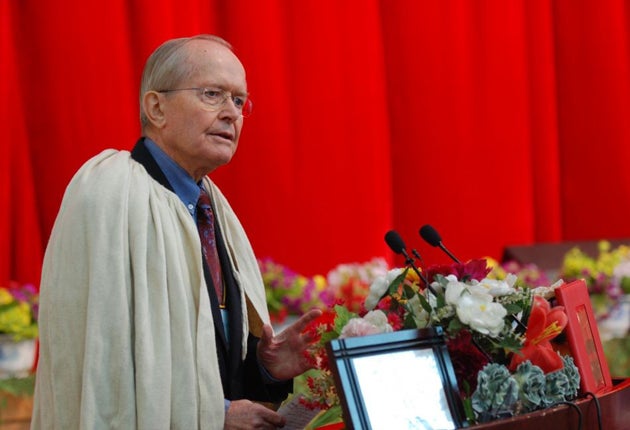James Hudson Taylor III: Theologian and Sinologist described as one of the most influential foreigners in China

James Hudson Taylor III was a missionary who followed in the distinguished footsteps of his forebears in a life devoted to religious and social initiatives in China. In 2007 he was awarded honorary citizenship of Sichuan province, a mark of the regard in which he was held by senior Chinese government officials, as well as by church leaders.
Taylor's great-grandfather, a Yorkshireman better known as Hudson Taylor, had founded the China Inland Mission in 1865, and was acclaimed by the church historian K.A. Latourette as "one of the four or five most influential foreigners in China" for his work in spreading Christianity.
James Hudson Taylor III was born in 1929 in Kaifeng, on the banks of the Yellow River, and was raised in China, becoming immersed in its language, thought forms and literature. His parents served with the Free Methodist Mission. When the Sino-Japanese war broke out, they arranged a sea passage home for the family, but then his father cancelled the tickets. It was, he said, "no time to leave China". Instead, he and his wife would move north-west to train church leaders, while their children were sent to board at Chefoo school.
After the attack on Pearl Harbour in December 1940, citizens of Allied nations felt very vulnerable, and these were deeply anxious days for separated families. Then, in 1942, the whole of Chefoo school was interned in Weihsien concentration camp. Eric Liddell, the 1924 Paris Olympian depicted in Chariots of Fire, died in the camp; he was a great friend to the schoolchildren and taught the boys games.
Camp life was tough and cramped. Summers were often blisteringly hot, and the children had to contend with swarms of flies and rats. The Taylor children also had their grandfather in the camp. Taylor reflected in 1999: "I saw in Grandpa how the patterns of life had been set. Every day began with praise." The camp was liberated on 17 August 1945 and the family reunited after five and a half years.
Taylor pursued his education in the United States, where he would return again later for further study at Yale University and Yale University Divinity School. In 1951 he married Leone Tjepkema, whom he had met while studying at Spring Arbor college in Michigan and Greenville college in Illinois. Their marriage was to prove a strong partnership.
In June 1955 the Taylors arrived in Kaohsiung, Taiwan, to join the staff of the Holy Light Bible school founded that year by his father, James Hudson Taylor II. Jim Taylor worked there as a lecturer before succeeding his father as principal in 1960. In 1970 he became president of the new China Evangelical Seminary in Taipei, providing theological education for university graduates.
From 1980-1991 Jim Taylor served as seventh General Director of the Overseas Missionary Fellowship (now OMF International) the mission founded by his great-grandfather; he was the first Taylor descendant in this role, and under his leadership, the Fellowship saw striking growth in Japan, Philippines and Hong Kong, and in publishing. By now nearly 80 per cent of East Asia's peoples lived in what had become known as "creative access nations", where no missionary visas were granted, but China was now welcoming westerners to contribute to its policy of "Four Modernisations", and was sending hundreds of its brightest to western universities.
In 1994 Taylor formed Medical Services International (now MSI Professional Services), based in Sichuan province. MSI's aim was to bring in teams of western professionals who would commit themselves to regular visits to work on health and community-development projects. The initiative was soon to diversify into accounting, English language, business management and livestock rearing.
In 1993 the marriage of Taylor's son, Jamie, to Ke Yeh Min from Taiwan, brought Chinese blood into the family line. Jim Taylor took especial delight in teaching Bible stories and New Testament Greek to James Hudson Taylor V (known as JT) and his sisters when the whole family lived in Hong Kong.
Jim Taylor had a strong sense of legacy; the legacy he had received in the seventh generation of his family's Christian history, and the legacy he himself would pass on. In 1988 he discovered the tombstone of his great-grandfather Hudson Taylor in Zhenjiang Museum, which had been kept by the museum after the destruction of the city's Foreign Cemetery. The remainder of the memorial (which had been erected by the China Inland Mission in 1905) was found later, intact. It gave him a deep sense of satisfaction to see it re-erected, inside a nearby church, and accompanied by Jamie and JT, in 1999.
His book on the life of Hudson Taylor's father-in-law, Even to Death: a biography of Samuel Dyer, co-authored with Irene Chang, will be published this year. Two Festschrifts, planned to celebrate his 80th birthday in August, will be released shortly.
Julia Cameron
James Hudson Taylor III, Sinologist and theologian: born Kaifeng, Henan, China 12 August 1929; married 1951 Leone Tjepkema (one son, two daughters); died Hong Kong 20 March 2009.
Join our commenting forum
Join thought-provoking conversations, follow other Independent readers and see their replies
Comments